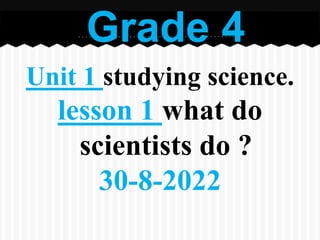
week-1 grade 4-Presentation.pptx
- 1. Unit 1 studying science. lesson 1 what do scientists do ? 30-8-2022 Grade 4
- 2. What Is A Scientist? And more importantly, how can I become one? PowerPoint by Veronica Gould
- 3. Before we can know what a scientist is, we have to understand science. Science is the study of the natural world gained through observation and experimentation. What Is Science?
- 4. Using our senses, we observe things • a thunderstorm • a bird flying to its nest • two paint colors mixing to form a third • shivering in the wintertime • the sound a cricket makes Observation
- 5. A scientist observes these things, too! When scientists make their observations, they always write them down. Scientists write their observations • in science journals • on data sheets • on experiment sheets Observation
- 6. What’s the difference between any person doing an experiment and a true scientist? a) A scientist has a PhD. b) A scientist has the proper equipment. c) A scientist writes down observations. d) A scientist wears a lab coat.
- 7. A scientist ALWAYS writes down their observations! Even though many scientists have PhDs and special technology — even a lab coat — the most important tool any scientist could have is a notebook to write down their observations! In fact, when you write in your science notebook, you join the scientific community as some of the youngest scientists. Welcome!
- 8. Before you can become a scientist, there are a few things you need to know about performing science experiments. 1. Scientists work in groups or teams. 2. Scientists use experiments to try to answer questions. 3. Scientists follow steps in an experiment. 4. Experiments can be a lot of FUN, and scientists always use experiments to learn. Performing An Experiment
- 9. Is this an example of an experiment?
- 10. ...It Might Not Be! Although lab equipment is often used in scientific experiments, equipment alone does not indicate experimentation. So how do we recognize experiment? So how do we recognize an experiment?
- 11. An experiment does the following: o Attempts to answer a question about the physical world o Follows a procedure o Tests an idea or hypothesis o Uses models or controlled systems Experimentation
- 12. You perform experiments every day without even knowing it! An experiment doesn't always use fancy lab equipment. Sometimes it’s as simple as testing a pen on a piece of paper to see if it will write. Can you think of any other examples of experiments? Everyday Experiments
- 13. So who is a scientist? Margaret Mead, anthropologist who observed and wrote about Samoan culture. Nikola Tesla, engineer who worked with electricity. James Watson, biologist who developed a model for DNA. Francoise Barre- Sinoussi, virologist who identified HIV as the cause of AIDS George Washington Carver, botanist who invented over 100 uses for the peanut.
- 14. You are! Who else is a scientist?